耶鲁大学校长2010年毕业致辞
耶鲁校长毕业演讲
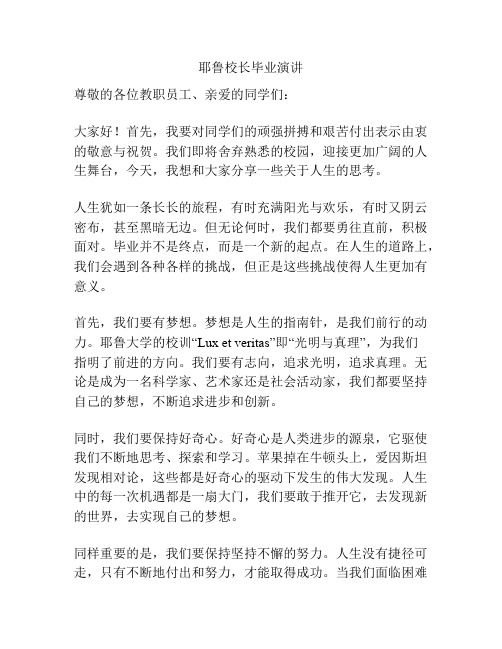
耶鲁校长毕业演讲尊敬的各位教职员工、亲爱的同学们:大家好!首先,我要对同学们的顽强拼搏和艰苦付出表示由衷的敬意与祝贺。
我们即将舍弃熟悉的校园,迎接更加广阔的人生舞台,今天,我想和大家分享一些关于人生的思考。
人生犹如一条长长的旅程,有时充满阳光与欢乐,有时又阴云密布,甚至黑暗无边。
但无论何时,我们都要勇往直前,积极面对。
毕业并不是终点,而是一个新的起点。
在人生的道路上,我们会遇到各种各样的挑战,但正是这些挑战使得人生更加有意义。
首先,我们要有梦想。
梦想是人生的指南针,是我们前行的动力。
耶鲁大学的校训“Lux et veritas”即“光明与真理”,为我们指明了前进的方向。
我们要有志向,追求光明,追求真理。
无论是成为一名科学家、艺术家还是社会活动家,我们都要坚持自己的梦想,不断追求进步和创新。
同时,我们要保持好奇心。
好奇心是人类进步的源泉,它驱使我们不断地思考、探索和学习。
苹果掉在牛顿头上,爱因斯坦发现相对论,这些都是好奇心的驱动下发生的伟大发现。
人生中的每一次机遇都是一扇大门,我们要敢于推开它,去发现新的世界,去实现自己的梦想。
同样重要的是,我们要保持坚持不懈的努力。
人生没有捷径可走,只有不断地付出和努力,才能取得成功。
当我们面临困难和挫折时,我们要学会坚持,不轻易放弃。
只有在坚持中,我们才能克服困难,取得真正的成长和进步。
最后,我们要珍惜友谊。
在耶鲁的时光里,我们结交了一生中的朋友,他们陪伴我们一起成长、一起学习,给予我们爱与支持。
这些友谊将伴随我们一生,无论何时何地,我们都要珍惜友谊,彼此支持、鼓励和帮助。
在这个喜悦而忧伤的日子里,我想对你们说:无论将来的道路如何曲折,无论前方的困难如何丛生,你们都不要害怕,勇敢地面对它们。
你们是耶鲁的骄傲,你们有着无尽的潜力和创造力。
相信自己,相信自己的能力,我相信,你们一定会取得辉煌的成就。
最后,我祝愿每一位毕业生都能在人生的旅途中找到属于自己的光明与真理,创造出属于自己的更加辉煌的未来。
《回归政治的本来面目》——耶鲁大学校长在2010届毕业典礼上的讲话
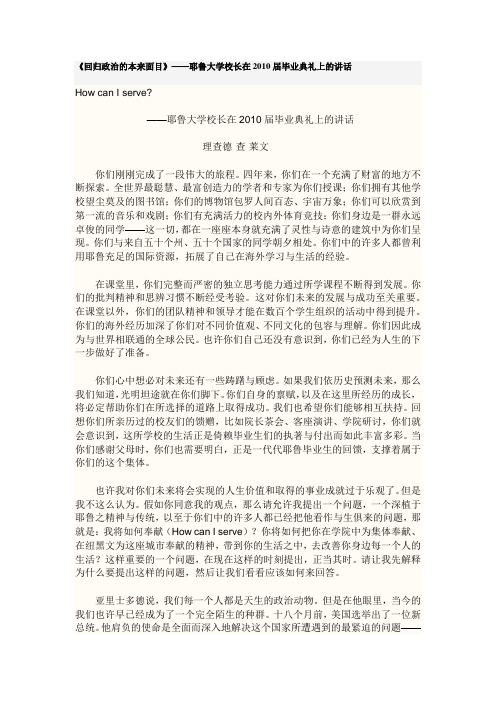
《回归政治的本来面目》——耶鲁大学校长在2010届毕业典礼上的讲话How can I serve?——耶鲁大学校长在2010届毕业典礼上的讲话理查德·查·莱文你们刚刚完成了一段伟大的旅程。
四年来,你们在一个充满了财富的地方不断探索。
全世界最聪慧、最富创造力的学者和专家为你们授课;你们拥有其他学校望尘莫及的图书馆;你们的博物馆包罗人间百态、宇宙万象;你们可以欣赏到第一流的音乐和戏剧;你们有充满活力的校内外体育竞技;你们身边是一群永远卓俊的同学——这一切,都在一座座本身就充满了灵性与诗意的建筑中为你们呈现。
你们与来自五十个州、五十个国家的同学朝夕相处。
你们中的许多人都曾利用耶鲁充足的国际资源,拓展了自己在海外学习与生活的经验。
在课堂里,你们完整而严密的独立思考能力通过所学课程不断得到发展。
你们的批判精神和思辨习惯不断经受考验。
这对你们未来的发展与成功至关重要。
在课堂以外,你们的团队精神和领导才能在数百个学生组织的活动中得到提升。
你们的海外经历加深了你们对不同价值观、不同文化的包容与理解。
你们因此成为与世界相联通的全球公民。
也许你们自己还没有意识到,你们已经为人生的下一步做好了准备。
你们心中想必对未来还有一些踌躇与顾虑。
如果我们依历史预测未来,那么我们知道,光明坦途就在你们脚下。
你们自身的禀赋,以及在这里所经历的成长,将必定帮助你们在所选择的道路上取得成功。
我们也希望你们能够相互扶持。
回想你们所亲历过的校友们的馈赠,比如院长茶会、客座演讲、学院研讨,你们就会意识到,这所学校的生活正是倚赖毕业生们的执著与付出而如此丰富多彩。
当你们感谢父母时,你们也需要明白,正是一代代耶鲁毕业生的回馈,支撑着属于你们的这个集体。
也许我对你们未来将会实现的人生价值和取得的事业成就过于乐观了。
但是我不这么认为。
假如你同意我的观点,那么请允许我提出一个问题,一个深植于耶鲁之精神与传统,以至于你们中的许多人都已经把他看作与生俱来的问题,那就是:我将如何奉献(How can I serve)?你将如何把你在学院中为集体奉献、在纽黑文为这座城市奉献的精神,带到你的生活之中,去改善你身边每一个人的生活?这样重要的一个问题,在现在这样的时刻提出,正当其时。
大学校长2010年毕业典礼演讲选登
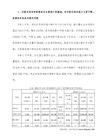
亲爱的同学们,你们在华中科技大学的几年给我留下了永恒的记忆。我记得你们为烈士寻亲千里,记得你们在公德长征路上的经历;我记得你们在各种社团取得的骄人成绩;我记得你们时而感到“无语”时而表现的焦虑,记得你们为中国的“常青藤”学校中无华中大一席而灰心丧气;我记得某些同学为“学位门”、为光谷同济医院的选址而愤激;我记得你们刚刚对我的呼喊:“根叔,你为我们做成了什么?”———是啊,我也得时时拷问自己的良心,到底为你们做了什么?还能为华中大学子做什么?
你们真幸运,国家的盛世如此集中相伴在你们大学的记忆中。08奥运留下的记忆,不仅是金牌数的第一,不仅是开
幕式的华丽,更是中华文化的魅力和民族向心力的显示;六十年大庆留下的记忆,不仅是领袖的挥手,不仅是自主研制的先进武器,不仅是女兵的微笑,不仅是队伍的威武整齐,更是改革开放的历史和旗帜的威力;世博会留下的记忆,不仅是世博之夜水火相容的神奇,不仅是中国馆的宏伟,不仅是异国场馆的浪漫,更是中华的崛起,世界的惊异。
我记得你们的自行车和热水瓶常常被偷,记得你们为抢占座位而付出的艰辛;记得你们在寒冷的冬天手脚冰凉,记得你们在炎热的夏季彻夜难眠;记得食堂常常让你们生气,我当然更记得自己说过的话:“我们绝不赚学生一分钱”,也记得你们对此言并不满意;但愿华中大尤其要有关于校园丑陋的记忆。只要我们共同记忆那些丑陋,总有一天,我们能将丑陋转化成美丽。
大学校长2010年毕业典礼演讲选登(一)
华中科技大学校长李培根
坚强而勇敢地到社会中去闯荡 2010-07-12
亲爱的2010届毕业生同学们:
你们好!
首先,为你们完成学业并即将踏上新的征途送上最美好的祝愿。
同学们,在华中科技大学的这几年里,你们一定有很多珍贵的记忆!
胡主席耶鲁大学演讲 中英对照

胡锦涛在耶鲁大学的演讲尊敬的理查德•莱文校长,同学们,老师们,女士们,先生们:首先,我感谢莱文校长的邀请,使我有机会来到世界著名学府耶鲁大学,同青年朋友和老师们相聚在一起。
进入耶鲁大学的校园,看到莘莘学子青春洋溢的脸庞,呼吸着书香浓郁的空气,我不由回想起40年前在北京年老师们对我的教诲,同学们给我的启发,我至今仍受用不尽。
耶鲁大学以悠久的发展历史、独特的办学风格、卓著的学术成就闻名于世。
如果时光能够倒流几十年,我真希望成为你们中的一员。
耶鲁大学校训强调追求光明和真理,这符合人类进步的法则,也符合每个有志青年的心愿。
300多年来,耶鲁大学培养出一大批杰出人才,其中包括20位诺贝尔奖获得者、5位美国总统。
美国民族英雄内森•黑尔是耶鲁校友,他的名言——“我唯一的憾事,就是没有第二次生命献给我的祖国”,深深感染了我和许多中国人。
我衷心祝愿贵校培养出更多英才,为美国经济社会发展、为人类进步事业作出更大贡献!女士们、先生们、朋友们!长期以来,中美两国人民一直相互抱有浓厚的兴趣和友好的感情。
中国人民欣赏美国人民的开拓进取精神,钦佩美国人民在建设国家中取得的骄人业绩。
随着中国的快速发展和中美合作的不断拓展,越来越多的美国人也把目光投向中国,更加关注中国的发展进步。
了解是信任的基础。
今天,我愿从中华文明历史流变和现实发展的角度,谈谈当代中国的发展战略和前进方向,希望有助于美国人民更全面、更深入地了解中国。
在5000多年的历史长河中,中华民族为人类文明进步作出了巨大贡献,同时也走过了曲折艰辛的道路。
特别是从1840年鸦片战争以来的160多年间,中国人民为摆脱积贫积弱的境遇,实现民族复兴,前仆后继,顽强斗争,使中华民族的命运发生了深刻变化。
95年前,中国人民通过辛亥革命推翻了统治中国几千年的君主专制制度,为中国的进步打开了闸门。
57年前,中国人民经过长期浴血奋斗实现了民族独立和人民解放,建立了人民当家作主的新中国。
28年前,中国人民开始了改革开放和现代化建设的伟大历史进程,经过艰苦创业取得了举世瞩目的巨大成就,从1978年到2005年,中国国内生产总值从1473亿美元增长到22257亿美元,进出口总额从206亿美元增长到14221亿美元,国家外汇储备从1.67亿美元增加到8189亿美元,农村贫困人口由2.5亿人减少到2300多万人。
耶鲁大学毕业典礼演讲稿:突破人生的桎梏
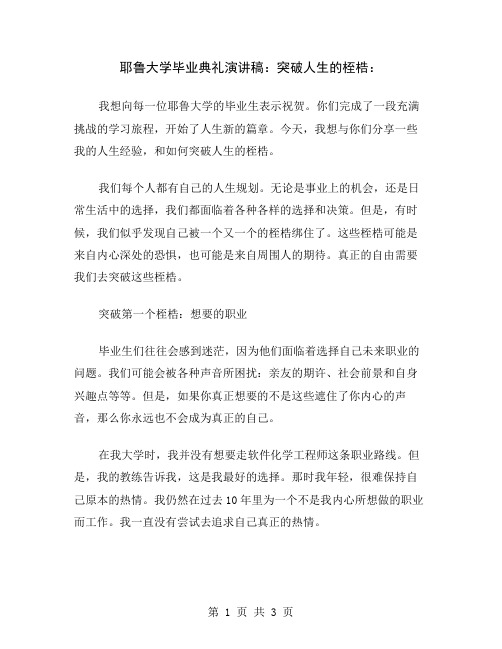
耶鲁大学毕业典礼演讲稿:突破人生的桎梏:我想向每一位耶鲁大学的毕业生表示祝贺。
你们完成了一段充满挑战的学习旅程,开始了人生新的篇章。
今天,我想与你们分享一些我的人生经验,和如何突破人生的桎梏。
我们每个人都有自己的人生规划。
无论是事业上的机会,还是日常生活中的选择,我们都面临着各种各样的选择和决策。
但是,有时候,我们似乎发现自己被一个又一个的桎梏绑住了。
这些桎梏可能是来自内心深处的恐惧,也可能是来自周围人的期待。
真正的自由需要我们去突破这些桎梏。
突破第一个桎梏:想要的职业毕业生们往往会感到迷茫,因为他们面临着选择自己未来职业的问题。
我们可能会被各种声音所困扰:亲友的期许、社会前景和自身兴趣点等等。
但是,如果你真正想要的不是这些遮住了你内心的声音,那么你永远也不会成为真正的自己。
在我大学时,我并没有想要走软件化学工程师这条职业路线。
但是,我的教练告诉我,这是我最好的选择。
那时我年轻,很难保持自己原本的热情。
我仍然在过去10年里为一个不是我内心所想做的职业而工作。
我一直没有尝试去追求自己真正的热情。
但是,我们必须要意识到,我们的人生是属于我们自己的。
我们需要勇敢地追求自己的热情,不断探索和发现,直到我们找到真正适合自己的事业方向。
突破第二个桎梏:舒适区每个人都有自己的舒适区,那些让我们感到安心、放心的地方,我们习惯于在这些地方徘徊,无法摆脱。
但是,这种习惯也让我们失去了机会去突破舒适区。
突破舒适区意味着我们需要尝试新的事物,挑战自己的极限和能力。
这些机会不仅可以带来新的成就和经验,更能让我们变得更加自信和坚强。
我曾经在一个从未接触过的领域里工作,这是一个完全陌生的环境,我需要学习大量的新知识和技能。
但是,这个机会也带来了很多机遇和奖励。
这让我突破了自己的舒适区,也实现了自己对未来的期许。
突破第三个桎梏:恐惧恐惧是一个普遍存在于人们心中的感觉。
我们害怕未来不稳定,害怕自己不够强大,害怕未来的挑战会让我们无法承受。
耶鲁大学校长的毕业致辞
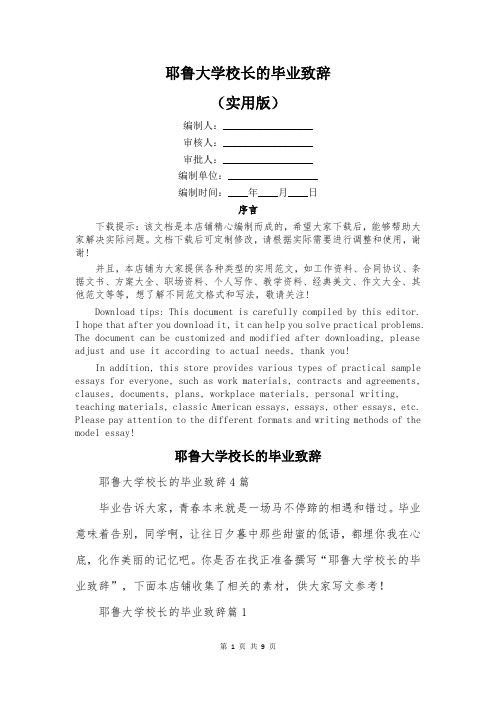
耶鲁大学校长的毕业致辞(实用版)编制人:__________________审核人:__________________审批人:__________________编制单位:__________________编制时间:____年____月____日序言下载提示:该文档是本店铺精心编制而成的,希望大家下载后,能够帮助大家解决实际问题。
文档下载后可定制修改,请根据实际需要进行调整和使用,谢谢!并且,本店铺为大家提供各种类型的实用范文,如工作资料、合同协议、条据文书、方案大全、职场资料、个人写作、教学资料、经典美文、作文大全、其他范文等等,想了解不同范文格式和写法,敬请关注!Download tips: This document is carefully compiled by this editor.I hope that after you download it, it can help you solve practical problems. The document can be customized and modified after downloading, please adjust and use it according to actual needs, thank you!In addition, this store provides various types of practical sample essays for everyone, such as work materials, contracts and agreements, clauses, documents, plans, workplace materials, personal writing, teaching materials, classic American essays, essays, other essays, etc. Please pay attention to the different formats and writing methods of the model essay!耶鲁大学校长的毕业致辞耶鲁大学校长的毕业致辞4篇毕业告诉大家,青春本来就是一场马不停蹄的相遇和错过。
耶鲁校长演讲稿
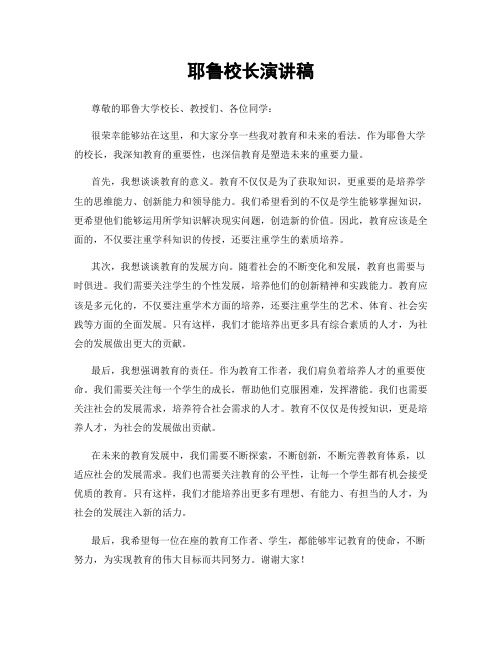
耶鲁校长演讲稿尊敬的耶鲁大学校长、教授们、各位同学:很荣幸能够站在这里,和大家分享一些我对教育和未来的看法。
作为耶鲁大学的校长,我深知教育的重要性,也深信教育是塑造未来的重要力量。
首先,我想谈谈教育的意义。
教育不仅仅是为了获取知识,更重要的是培养学生的思维能力、创新能力和领导能力。
我们希望看到的不仅是学生能够掌握知识,更希望他们能够运用所学知识解决现实问题,创造新的价值。
因此,教育应该是全面的,不仅要注重学科知识的传授,还要注重学生的素质培养。
其次,我想谈谈教育的发展方向。
随着社会的不断变化和发展,教育也需要与时俱进。
我们需要关注学生的个性发展,培养他们的创新精神和实践能力。
教育应该是多元化的,不仅要注重学术方面的培养,还要注重学生的艺术、体育、社会实践等方面的全面发展。
只有这样,我们才能培养出更多具有综合素质的人才,为社会的发展做出更大的贡献。
最后,我想强调教育的责任。
作为教育工作者,我们肩负着培养人才的重要使命。
我们需要关注每一个学生的成长,帮助他们克服困难,发挥潜能。
我们也需要关注社会的发展需求,培养符合社会需求的人才。
教育不仅仅是传授知识,更是培养人才,为社会的发展做出贡献。
在未来的教育发展中,我们需要不断探索,不断创新,不断完善教育体系,以适应社会的发展需求。
我们也需要关注教育的公平性,让每一个学生都有机会接受优质的教育。
只有这样,我们才能培养出更多有理想、有能力、有担当的人才,为社会的发展注入新的活力。
最后,我希望每一位在座的教育工作者、学生,都能够牢记教育的使命,不断努力,为实现教育的伟大目标而共同努力。
谢谢大家!以上就是我的演讲稿,希望能够对大家有所启发。
感谢大家的聆听。
耶鲁大学校长2010年毕业致辞
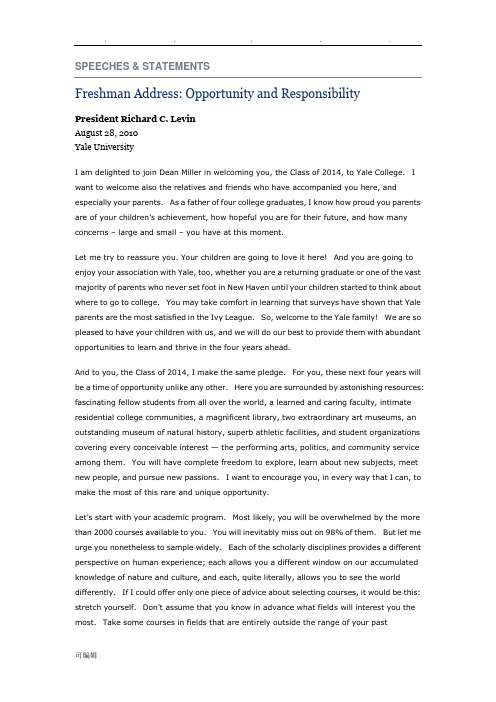
Freshman Address: Opportunity and ResponsibilityPresident Richard C. LevinAugust 28, 2010Yale UniversityI am delighted to join Dean Miller in welcoming you, the Class of 2014, to Yale College. I want to welcome also the relatives and friends who have accompanied you here, and especially your parents. As a father of four college graduates, I know how proud you parents are of your children’s achievement, how hopeful you are for their future, and how many concerns – large and small – you have at this moment.Let me try to reassure you. Your children are going to love it here! And you are going to enjoy your association with Yale, too, whether you are a returning graduate or one of the vast majority of parents who never set foot in New Haven until your children started to think about where to go to college. You may take comfort in learning that surveys have shown that Yale parents are the most satisfied in the Ivy League. So, welcome to the Yale family! We are so pleased to have your children with us, and we will do our best to provide them with abundant opportunities to learn and thrive in the four years ahead.And to you, the Class of 2014, I make the same pledge. For you, these next four years will be a time of opportunity unlike any other. Here you are surrounded by astonishing resources: fascinating fellow students from all over the world, a learned and caring faculty, intimate residential college communities, a magnificent library, two extraordinary art museums, an outstanding museum of natural history, superb athletic facilities, and student organizations covering every conceivable interest — the performing arts, politics, and community service among them. You will have complete freedom to explore, learn about new subjects, meet new people, and pursue new passions. I want to encourage you, in every way that I can, to make the most of this rare and unique opportunity.Let’s start with your academic program.Most likely, you will be overwhelmed by the more than 2000 courses available to you. You will inevitably miss out on 98% of them. But let me urge you nonetheless to sample widely. Each of the scholarly disciplines provides a different perspective on human experience; each allows you a different window on our accumulated knowledge of nature and culture, and each, quite literally, allows you to see the world differently. If I could offer only one piece of advice about selecting courses, it would be this: stretch yourself. Don’t assume that you know in advance what field s will interest you the most. Take some courses in fields that are entirely outside the range of your pastexperience. You will not only emerge as a more broadly educated person, but you will also stand a better chance of discovering an unsuspected passion that helps to shape the future course of your life.By studying philosophy, for example, you will learn to reason more rigorously and to discern more readily what constitutes a logically consistent argument and what does not. And you will study texts that wrestle directly with the deepest questions of how one shouldlive.Your professors of literature, music, and art history will teach you to read, listen, and see closely, and help you to develop a keener appreciation for the artistry that makes literature, music, and visual art sublime representations of human emotions, values, andideas. Whether you major in these subjects or not, your appreciation of what is true and beautiful may be forever enriched.Your professors of history will teach you to appreciate the challenging art of reconstructing the past, and to understand how meaning is extracted from experience. This may help you to gain perspective on your own experience.Years ago, when I taught introductory economics in Yale College, I always began by telling the students that the course would change their lives. Why? Because economics will open you to an entirely new and different way of understanding how the world works. Economics will not prescribe for you how society should be organized, or the extent to which individual freedom should be subordinated to collective ends, or how the fruits of human labor should be distributed. But understanding the logic of markets will give you a new way to think about these perpetually important questions. In similar fashion, each of the other social sciences — psychology, political science, anthropology, sociology, and linguistics — will give you a different perspective on human experience in society.Some of you may already have a passion for science or mathematics, and you may have set your sights on a major in science, math, or engineering. There is so much in these pursuits to excite the imagination that I hardly need elaborate. In science, we are in the midst of discovering the causes of human disease, the mechanisms of evolution, and the origins of the universe. In engineering, we have unprecedented opportunities to develop new materials, new medical devices, and new sources of energy. One of the virtues of studying science and engineering at a place like Yale is that you can practice science and engineering while you study it; you can work in research laboratories along side your professors on problems at the very frontier of knowledge.With respect to science, I have two messages for you that are mirror images. First, if you are someone with an early or emerging passion for science, take the time to sample othersubjects as well. Even if you pursue science or engineering as a career, broadening your education in the other liberal arts will both enrich your lives and improve yourscience. Second, if you do not think yourself a “science type,” don’t just fulfill the science requirement; give science a serious try. During the past decade, we have developed a number of problem-oriented science courses without prerequisites; they are meant to give you a rigorous exposure to science without the comprehensiveness of a survey course designed for those already committed to a major or to a pre-medical curriculum. Try one or two of these courses, early on; you may be surprised by your newfound enthusiasm.And, to complete this mini-tour of the curriculum, we will not let you forget about writing, math, and languages. Some attention to these skills is required, but there are many ways to satisfy the requirements. Again, I would urge you to stretch yourselves; try something different — an expository or creative writing class, statistics instead of more calculus, or a new language, even as you pursue further study of one you already know.My suggestion that you stretch yourselves is not limited to the classroom. It applies to both the friends and extracurricular activities you choose as well. If the friends you make here are exclusively those who come from backgrounds just like your own and went to high schools just like your own, you will have forfeited half the value of a Yale education. You come from all 50 states and 58 nations, from a wide range of racial, religious, and socio-economic backgrounds. Each of your residential colleges reflects within itself that rich diversity. Seek out friends with different histories and different interests; you will find that you learn the most from the people least like you.No doubt you will participate in one or more of the 300 student organizations on campus, as well as varsity, club, and intramural athletic teams. You may find your consuming passion, the passion that shapes your life after Yale, in one of these pursuits. I can think of scores of journalists, public servants, teachers, start-up entrepreneurs, performers, and filmmakers whose career choices were shaped by their extracurricular activities here at Yale. Again, my advice is to move beyond the familiar; try at least one extracurricular activity that is brand new to you. And, by all means, do not spend all your time with your varsity teammates, or your fellow singing group members, or the others who write for the Yale Daily News. Make the most of the extraordinary variety of opportunities available to you.So far, my advice to you is focused entirely on how you might get the most out of your Yale education. You might be wondering: am I here just to exploit all of Yale’s treasures for myself alone? The answer is “no.”We have confidence, based on the evidence of history and knowledge of the culture of this place, that your journey toward self-discovery, your progress toward finding your passion, will yield more than self-gratification and personal advancement. We believe that because you are intelligent and reflective members of acommunity of scholars, you will come to recognize that with the abundant opportunities for self-enrichment that Yale provides, there also come responsibilities.And what are these responsibilities? They begin with responsibility for the wellbeing of the institution you are joining today. Let me remind you that even for those of you whose parents are paying the full tuition, room and board charges, more than half of the total cost of your Yale education is supported by the gifts of those who came before you. More than half of you hold scholarships. And most of our buildings, athletic facilities, and museum and library collections trace to gifts from graduates of Yale College.Your responsibilities also include good citizenship in its many varieties. At Yale’s f ounding this took the form of supporting New Haven colony and the Congregational Church. Today, while volunteer service to local community organizations, secular and religious, remains a distinguishing characteristic of Yale graduates, our horizons have broadened. Some of you will undoubtedly carry on Yale’s great tradition of producing national leaders, and for all of you who spend most of your adult lives in the United States, there is an emerging burden of citizenship that will be yours to bear. And that is the powerfully important burden of helping to raise the level of public discourse. One has only to compare the rhetoric of today’s leaders with the speeches of Abraham Lincoln, given 150 years ago, or the transcripts of the Kennedy-Nixon debates of 50 years ago, to see how oversimplified ideology and appeal to narrow interest groups have triumphed over intelligence and moderation in civic discussion. By insisting, as citizens, on serious discussion instead of slogans that mask narrow partisan interests, you can help to make our democracy more effective.Today, because the world is so highly interconnected and interdependent, you will have the added responsibility of acting as global citizens. Your generation, more than any that has gone before, will need deep knowledge of and intimate engagement with cultures and societies very different from your own. Those of you who come from abroad will of course experience immersion in another culture right here in New Haven. The rest of you may do so by taking advantage of one of our many programs of work or study abroad. Such an experience will stretch you in just the way that I am recommending more generally; it will force you to see yourself from a different perspective, and to see others free from preconceptions. Since so many of the issues confronting us — from poverty and disease to the proliferation of nuclear weapons — require cooperative solutions, a cross-cultural perspective is invaluable. Even before you travel overseas, you might start preparing yourselves for global citizenship by sampling some of the courses in international studies offered by the recently established Jackson Institute, such as the new multidisciplinary gateway course on global affairs.In addition to the burdens of local, national, and international citizenship, your generation will need to rise as well to the challenge of planetary stewardship. Without a radical reduction in emissions of greenhouse gases during your lifetimes, much of humanity will suffer dislocation and famine on an unprecedented scale. We have both the current means to slow down the accumulation of atmospheric carbon and the imagination to develop the technologies needed to prevent catastrophe. We seem to lack only conviction and collective will. You will need to scrutinize the evidence for yourselves, with all the critical intelligence that you can muster. But, if you do, I am confident that you will assume this last responsibility as well. And you will have the opportunity to practice planetary stewardship right here at Yale, as we try to model what it means to become a sustainable campus.Women and men of the Class of 2014, we take great pleasure in welcoming you to Yale College, and we delight in the anticipation of opportunities that you will seize and the responsibilities that you will come to bear as citizens of your communities, the nation, the world, and the planet.。
- 1、下载文档前请自行甄别文档内容的完整性,平台不提供额外的编辑、内容补充、找答案等附加服务。
- 2、"仅部分预览"的文档,不可在线预览部分如存在完整性等问题,可反馈申请退款(可完整预览的文档不适用该条件!)。
- 3、如文档侵犯您的权益,请联系客服反馈,我们会尽快为您处理(人工客服工作时间:9:00-18:30)。
Freshman Address: Opportunity and ResponsibilityPresident Richard C. LevinAugust 28, 2010Yale UniversityI am delighted to join Dean Miller in welcoming you, the Class of 2014, to Yale College. I want to welcome also the relatives and friends who have accompanied you here, and especially your parents. As a father of four college graduates, I know how proud you parents are of your children’s achievement, how hopeful you are for their future, and how many concerns – large and small – you have at this moment.Let me try to reassure you. Your children are going to love it here! And you are going to enjoy your association with Yale, too, whether you are a returning graduate or one of the vast majority of parents who never set foot in New Haven until your children started to think about where to go to college. You may take comfort in learning that surveys have shown that Yale parents are the most satisfied in the Ivy League. So, welcome to the Yale family! We are so pleased to have your children with us, and we will do our best to provide them with abundant opportunities to learn and thrive in the four years ahead.And to you, the Class of 2014, I make the same pledge. For you, these next four years will be a time of opportunity unlike any other. Here you are surrounded by astonishing resources: fascinating fellow students from all over the world, a learned and caring faculty, intimate residential college communities, a magnificent library, two extraordinary art museums, an outstanding museum of natural history, superb athletic facilities, and student organizations covering every conceivable interest — the performing arts, politics, and community service among them. You will have complete freedom to explore, learn about new subjects, meet new people, and pursue new passions. I want to encourage you, in every way that I can, to make the most of this rare and unique opportunity.Let’s start with your academic program.Most likely, you will be overwhelmed by the more than 2000 courses available to you. You will inevitably miss out on 98% of them. But let me urge you nonetheless to sample widely. Each of the scholarly disciplines provides a different perspective on human experience; each allows you a different window on our accumulated knowledge of nature and culture, and each, quite literally, allows you to see the world differently. If I could offer only one piece of advice about selecting courses, it would be this: stretch yourself. Don’t assume that you know in advance what field s will interest you the most. Take some courses in fields that are entirely outside the range of your pastexperience. You will not only emerge as a more broadly educated person, but you will also stand a better chance of discovering an unsuspected passion that helps to shape the future course of your life.By studying philosophy, for example, you will learn to reason more rigorously and to discern more readily what constitutes a logically consistent argument and what does not. And you will study texts that wrestle directly with the deepest questions of how one shouldlive.Your professors of literature, music, and art history will teach you to read, listen, and see closely, and help you to develop a keener appreciation for the artistry that makes literature, music, and visual art sublime representations of human emotions, values, andideas. Whether you major in these subjects or not, your appreciation of what is true and beautiful may be forever enriched.Your professors of history will teach you to appreciate the challenging art of reconstructing the past, and to understand how meaning is extracted from experience. This may help you to gain perspective on your own experience.Years ago, when I taught introductory economics in Yale College, I always began by telling the students that the course would change their lives. Why? Because economics will open you to an entirely new and different way of understanding how the world works. Economics will not prescribe for you how society should be organized, or the extent to which individual freedom should be subordinated to collective ends, or how the fruits of human labor should be distributed. But understanding the logic of markets will give you a new way to think about these perpetually important questions. In similar fashion, each of the other social sciences — psychology, political science, anthropology, sociology, and linguistics — will give you a different perspective on human experience in society.Some of you may already have a passion for science or mathematics, and you may have set your sights on a major in science, math, or engineering. There is so much in these pursuits to excite the imagination that I hardly need elaborate. In science, we are in the midst of discovering the causes of human disease, the mechanisms of evolution, and the origins of the universe. In engineering, we have unprecedented opportunities to develop new materials, new medical devices, and new sources of energy. One of the virtues of studying science and engineering at a place like Yale is that you can practice science and engineering while you study it; you can work in research laboratories along side your professors on problems at the very frontier of knowledge.With respect to science, I have two messages for you that are mirror images. First, if you are someone with an early or emerging passion for science, take the time to sample othersubjects as well. Even if you pursue science or engineering as a career, broadening your education in the other liberal arts will both enrich your lives and improve yourscience. Second, if you do not think yourself a ―science type,‖ don’t just fulfill the science requirement; give science a serious try. During the past decade, we have developed a number of problem-oriented science courses without prerequisites; they are meant to give you a rigorous exposure to science without the comprehensiveness of a survey course designed for those already committed to a major or to a pre-medical curriculum. Try one or two of these courses, early on; you may be surprised by your newfound enthusiasm.And, to complete this mini-tour of the curriculum, we will not let you forget about writing, math, and languages. Some attention to these skills is required, but there are many ways to satisfy the requirements. Again, I would urge you to stretch yourselves; try something different — an expository or creative writing class, statistics instead of more calculus, or a new language, even as you pursue further study of one you already know.My suggestion that you stretch yourselves is not limited to the classroom. It applies to both the friends and extracurricular activities you choose as well. If the friends you make here are exclusively those who come from backgrounds just like your own and went to high schools just like your own, you will have forfeited half the value of a Yale education. You come from all 50 states and 58 nations, from a wide range of racial, religious, and socio-economic backgrounds. Each of your residential colleges reflects within itself that rich diversity. Seek out friends with different histories and different interests; you will find that you learn the most from the people least like you.No doubt you will participate in one or more of the 300 student organizations on campus, as well as varsity, club, and intramural athletic teams. You may find your consuming passion, the passion that shapes your life after Yale, in one of these pursuits. I can think of scores of journalists, public servants, teachers, start-up entrepreneurs, performers, and filmmakers whose career choices were shaped by their extracurricular activities here at Yale. Again, my advice is to move beyond the familiar; try at least one extracurricular activity that is brand new to you. And, by all means, do not spend all your time with your varsity teammates, or your fellow singing group members, or the others who write for the Yale Daily News. Make the most of the extraordinary variety of opportunities available to you.So far, my advice to you is focused entirely on how you might get the most out of your Yale education. You might be wondering: am I here just to exploit all of Yale’s treasures for myself alone? The answer is ―no.‖We have confidence, based on the evidence of history and knowledge of the culture of this place, that your journey toward self-discovery, your progress toward finding your passion, will yield more than self-gratification and personal advancement. We believe that because you are intelligent and reflective members of acommunity of scholars, you will come to recognize that with the abundant opportunities for self-enrichment that Yale provides, there also come responsibilities.And what are these responsibilities? They begin with responsibility for the wellbeing of the institution you are joining today. Let me remind you that even for those of you whose parents are paying the full tuition, room and board charges, more than half of the total cost of your Yale education is supported by the gifts of those who came before you. More than half of you hold scholarships. And most of our buildings, athletic facilities, and museum and library collections trace to gifts from graduates of Yale College.Your responsibilities also include good citizenship in its many varieties. At Yale’s f ounding this took the form of supporting New Haven colony and the Congregational Church. Today, while volunteer service to local community organizations, secular and religious, remains a distinguishing characteristic of Yale graduates, our horizons have broadened. Some of you will undoubtedly carry on Yale’s great tradition of producing national leaders, and for all of you who spend most of your adult lives in the United States, there is an emerging burden of citizenship that will be yours to bear. And that is the powerfully important burden of helping to raise the level of public discourse. One has only to compare the rhetoric of today’s leaders with the speeches of Abraham Lincoln, given 150 years ago, or the transcripts of the Kennedy-Nixon debates of 50 years ago, to see how oversimplified ideology and appeal to narrow interest groups have triumphed over intelligence and moderation in civic discussion. By insisting, as citizens, on serious discussion instead of slogans that mask narrow partisan interests, you can help to make our democracy more effective.Today, because the world is so highly interconnected and interdependent, you will have the added responsibility of acting as global citizens. Your generation, more than any that has gone before, will need deep knowledge of and intimate engagement with cultures and societies very different from your own. Those of you who come from abroad will of course experience immersion in another culture right here in New Haven. The rest of you may do so by taking advantage of one of our many programs of work or study abroad. Such an experience will stretch you in just the way that I am recommending more generally; it will force you to see yourself from a different perspective, and to see others free from preconceptions. Since so many of the issues confronting us — from poverty and disease to the proliferation of nuclear weapons — require cooperative solutions, a cross-cultural perspective is invaluable. Even before you travel overseas, you might start preparing yourselves for global citizenship by sampling some of the courses in international studies offered by the recently established Jackson Institute, such as the new multidisciplinary gateway course on global affairs.In addition to the burdens of local, national, and international citizenship, your generation will need to rise as well to the challenge of planetary stewardship. Without a radical reduction in emissions of greenhouse gases during your lifetimes, much of humanity will suffer dislocation and famine on an unprecedented scale. We have both the current means to slow down the accumulation of atmospheric carbon and the imagination to develop the technologies needed to prevent catastrophe. We seem to lack only conviction and collective will. You will need to scrutinize the evidence for yourselves, with all the critical intelligence that you can muster. But, if you do, I am confident that you will assume this last responsibility as well. And you will have the opportunity to practice planetary stewardship right here at Yale, as we try to model what it means to become a sustainable campus.Women and men of the Class of 2014, we take great pleasure in welcoming you to Yale College, and we delight in the anticipation of opportunities that you will seize and the responsibilities that you will come to bear as citizens of your communities, the nation, the world, and the planet.。
